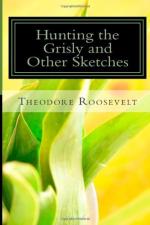The grisly is now chiefly a beast of the high hills and heavy timber; but this is merely because he has learned that he must rely on cover to guard him from man, and has forsaken the open ground accordingly. In old days, and in one or two very out-of-the-way places almost to the present time, he wandered at will over the plains. It is only the wariness born of fear which nowadays causes him to cling to the thick brush of the large river-bottoms throughout the plains country. When there were no rifle-bearing hunters in the land, to harass him and make him afraid, he roved thither and thither at will, in burly self-confidence. Then he cared little for cover, unless as a weather-break, or because it happened to contain food he liked. If the humor seized him he would roam for days over the rolling or broken prairie, searching for roots, digging up gophers, or perhaps following the great buffalo herds either to prey on some unwary straggler which he was able to catch at a disadvantage in a washout, or else to feast on the carcasses of those which died by accident. Old hunters, survivors of the long-vanished ages when the vast herds thronged the high plains and were followed by the wild red tribes, and by bands of whites who were scarcely less savage, have told me that they often met bears under such circumstances; and these bears were accustomed to sleep in a patch of rank sage bush, in the niche of a washout, or under the lee of a boulder, seeking their food abroad even in full daylight. The bears of the Upper Missouri basin—which were so light in color that the early explorers often alluded to them as gray or even as “white”—were particularly given to this life in the open. To this day that close kinsman of the grisly known as the bear of the barren grounds continues to lead this same kind of life, in the far north. My friend Mr. Rockhill, of Maryland, who was the first white man to explore eastern Tibet, describes the large, grisly-like bear of those desolate uplands as having similar habits.
However, the grisly is a shrewd beast and shows the usual bear-like capacity for adapting himself to changed conditions. He has in most places become a cover-haunting animal, sly in his ways, wary to a degree and clinging to the shelter of the deepest forests in the mountains and of the most tangled thickets in the plains. Hence he has held his own far better than such game as the bison and elk. He is much less common than formerly, but he is still to be found throughout most of his former range; save of course in the immediate neighborhood of the large towns.
In most places the grisly hibernates, or as old hunters say “holes up,” during the cold season, precisely as does the black bear; but as with the latter species, those animals which live farthest south spend the whole year abroad in mild seasons. The grisly rarely chooses that favorite den of his little black brother, a hollow tree or log, for his winter sleep, seeking or making some cavernous hole in the ground instead. The hole is sometimes in a slight hillock in a river bottom but more often on a hill-side, and may be either shallow or deep. In the mountains it is generally a natural cave in the rock, but among the foothills and on the plains the bear usually has to take some hollow or opening, and then fashion it into a burrow to his liking with his big digging claws.




